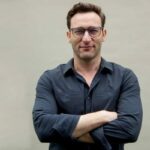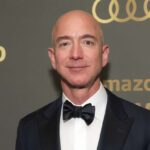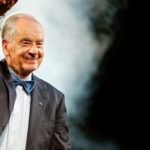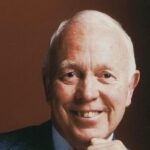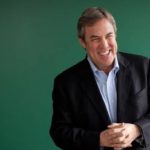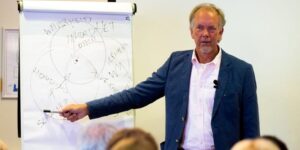Vinod Khosla biography and net worth
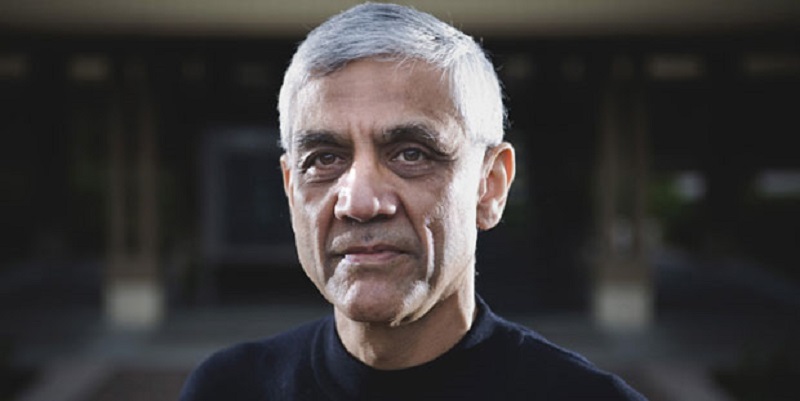
Vinod Khosla (1955) is an Indian-American businessman, investor and technologist. Vinod Khosla is the co-founder of the well-known Sun Microsystems and also founder of Khosla Ventures. He earned much of his immense wealth from venture capital investments. He did these mainly in energy technology, software and networks. He is considered one of the most successful venture capitalists. Vinod also is a charter member of The Indus Entrepreneurs (TiE).
The biography of Vinod Khosla
Vinod Khosla was born on January 28, 1955 in New Delhi. His father was an Indian officer in the Armed Forces of India and was stationed in New Delhi. His father wanted Vinod to join the army too. However, he developed other interests. He was interested in entrepreneurship, for example, after reading as a teenager about the founding of Intel by Andrew Grove and Robert Noyce. Today, Intel is the largest manufacturer of central processing units and semiconductors.
Vinod was convinced that he could achieve a successful career in technology. This idea was reinforced when he read that Intel co-founder Andrew Grove got money from investors when the company was still in its infancy.
Education, academic background and early career
He obtained a technology degree in electrical engineering from the prestigious Indian Institute of Technology (IIT) in Delhi. After completing this education, he tried to start his own company, but the venture failed. He then left for the United States.
He started a master’s degree in biomedical engineering at Carnegie Mellon University. He later did an MBA from Stanford University Graduate School of Business in 1980. At Stanford, he met some like-minded people and developed a new business idea.
Companies and investments
After earning his MBA at Stanford, Vinod developed a new business plan for an electronic design automation company. He also became acquainted with Intel employees and became the founder and full-time chief of Daisy Systems. The company focused on building custom computer hardware for its software. This venture also failed. This time due to economic problems.
Khosla co-founded Sun Microsystems in 1982. He did this along with Scott McNealy and Andy Bechtolsheim. Later, Bill Joy was introduced, a computer science graduate student at UC Berkeley. Sun primarily sold servers to universities and other academic institutions. They also sold desktop computers and Java software.
Khosla found his first investments at venture capital firm Kleiner Perkins Caufield & Byers. Within five years, Sun Microsystems generated $1 billion in revenue. Key figures such as Eric Schmidt and Carol Bartz were also recruited during these early years of the company.
In the year 1986, Vinod Khosla joined the venture capital firm Kleiner Perkins, as a general partner. Here he managed investments in the technology portfolio, such as video games and semiconductors.
He also contributed to the development of Nexgen, which was later sold to AMD, the first successful clone of Intel. He also invested in Go Corporation, which was working on a computer that worked with a stylus.
In 1994, he suggested that Excite adapt its search engine for the Internet. He also helped fund a special drive needed for the search engine to function. He remained involved with the company until it was sold for $7 billion. This was his first venture capital deal of such magnitude.
During these years, Khosla also became an advocate of fiber optics and the Internet for faster communication. Therefore, he began to focus on telecommunications companies. He started developing the company Juniper Networks and suggested using an internet router instead of the usual “vanilla router”. He invested $250,000 and earned more than $7 billion for the Kleiner Perkins company with a $3 million investment in Juniper Networks.
He did the same trick for Ceren Corporation, a company that was sold to Cisco for $7.8 billion. Siara also did well under his rule. This company was sold for $3 billion when he was the CEO for a year.
Khosla Ventures to a new level
In 2004, Khosla stepped down from Kleiner Perkins, worked part-time for a while and then left the company for good to spend more time with his children. He also concentrated on technology start-ups.
A little while later, he founded his own venture capital firm Khosla Ventures. He did this as a way to invest in experimental technology. He thought it was important that his investments had a societal and social impact. Khosla Ventures is based in Menlo Park, California.
The company eventually grew strongly and became known for early investments in alternative energies, such as solar energy, biofuel and batteries. Vinod has always been outspoken about alternative energy. He argues that the focus should be on clean energy breakthroughs, rather than on reducing energy consumption.
The company partnered with companies such as LanzaTech and QuantumScape, companies involved in carbon recycling, jet fuel and solid state batteries.
Artificial Intelligence
In 2010, Khosla Ventures first invested in food, investing in companies such as Instacart and DoorDash. It also invested in Fintech. That same year, it was announced that former Prime Minister Tony Blair of the United Kingdom would be joining to provide strategic advice regarding investments in technology focused on the environment.
Vinod Khosla then started investing in medicines and robotics, mainly by companies involved in artificial intelligence in medical treatments.
In 2018, Vinod Khosla stated that the plan for the rest of his life is to reinvent societal infrastructure through innovation and technology. Examples include 3D printers for houses and the homeless. He argues that far-reaching changes are needed if billions of people in China and India are to enjoy the Western lifestyle.
Khosla Ventures today manages approximately $15 billion in investment capital and investments funded by Khosla himself.
Net worth
Forbes counted Vinod Khosla among the 400 richest people in the United States in 2014. In 2021, he was in 92nd place on this list. Today, Vinod Khosla’s net worth is estimated by Forbes at $4.7 billion, ranking 551 in the list of the richest people on Earth.
Highlight of Khosla are:
- Founder of Khosla Ventures, Silicon Valley venture capital firm
- Khosla Ventures invests in experimental technologies such as robotics and biomedicine
- Khosla spent 18 years with venture capital firm Kleiner Perkins Caufield & Byers
- Khosla is married to his childhood friend Neeru Khosla and they have 4 children together
Vinod Khosla will be 68 years old in 2023.
Vinod Khosla quotes
- “An entrepreneur is someone who dares to dream the dreams and is foolish enough to try to make those dreams come true.”
- “Any problem is an opportunity. The bigger the problem, the bigger the opportunity.”
- “Big data will replace the need for 80% of all doctors.”
- “Certain food-based biofuels like biodiesel have always been a bad idea. Others like corn ethanol have served a useful purpose and essentially are obsoleting themselves.”
- “Communication always changes society, and society was always organized around communication channels. Two hundred years ago it was mostly rivers. It was sea-lanes and mountain passes. The Internet is another form of communication and commerce. And society organizes around the channels.”
- “Doctors can be replaced by software – 80% of them can. I’d much rather have a good machine learning system diagnose my disease than the median or average doctor.”
- “Eighty percent of what doctors do, tech can do at a fraction of the cost – especially your rural doctor in India.”
- “Electric cars are coal-powered cars. Their carbon emissions can be worse than gasoline-powered cars.”
- “Entrepreneurs can benefit a lot from the right help and advice, and you can avoid costly mistakes. You can get incredible leverage in hiring people who wouldn’t even talk to you if you have the right help. An investor isn’t about money – it’s about the help and advice you can get.”
- “Every big problem is a big opportunity.”
- “Everybody else is afraid to fail. I do not really care because when I fail, I try something new.”
- “Future is not extrapolation of past.”
- “How would you compete against yourself?”
- “I believe cellulosic fuels, biofuels made from nonfood crops are the only solution that will make a difference.”
- “I don’t mind the low probability of success, but it better be impactful if we do succeed.”
- “I don’t know a startup that hasn’t been through tough times.”
- “I generally disagree with most of the very high margin opportunities. Why? Because it’s a business strategy tradeoff: the lower the margin you take, the faster you grow.”
- “I’m not a political person. I’m a techie nerd, and I enjoy the techie part. I mean, all my life, I’ve loved great technology.”
- “I’ve probably failed more often than anybody else in Silicon Valley. Those don’t matter. I don’t remember the failures. You remember the big successes.”
- “If everyone played it safe, we wouldn’t get anywhere.”
- “If I wanted to be a doctor today I’d go to math school not med school.”
- “Imagine the world of mobile based on Nokia and Motorola if Apple had not been restarted by a missionary entrepreneur named Steve Jobs who cared more for his vision than being tactical and financial.”
- “In my view, it’s irreverence, foolish confidence and naivety combined with persistence, open mindedness and a continual ability to learn that created Facebook, Google, Yahoo, eBay, Microsoft, Apple, Juniper, AOL, Sun Microsystems and others.”
- “In the next 10 years, data science and software will do more for medicine than all of the biological sciences together.”
- “Innovative, bottom-up methods will solve problems that now seem intractable – from energy to poverty to disease. Science and technology, powered by the fuel of entrepreneurial energy, are the largest multipliers of resources we have to solve our many social problems.”
- “Is it 10 years, 20, 50 before we reach that tipping point where climate change becomes irreversible? Nobody can know. There’s clearly a probability distribution. We need to ensure this planet, and we need to do it quickly.”
- “It doesn’t matter what your probability of failure is. If there’s a 90% chance of failure, there’s a 10% chance of changing the world.”
- “It’s really important not to have everybody come from the same background or have the same point of view. It’s important that everybody respects everybody in the team, but that they are very different. I think it’s really important to have disagreement, diversity and the ability to debate.”
- “I’ve probably failed more often than anybody else in Silicon Valley. Those don’t matter. I don’t remember the failures. You remember the big successes.”
- “Knowing whose advice to take and on what topic is the single-most important decision an entrepreneur can make.”
- “Maybe some percentage that’s substantially larger than 95 percent of VCs add zero value. I would bet that 70-80 percent add negative value to a startup in their advising.”
- “No one will pay you to solve a non-problem.”
- “Not thinking it’s possible is a failure of imagination.”
- “One of the best things data can enable us to do is to ask questions we didn’t know to ask.”
- “Religion asks you to believe things without questioning, and technology and science always encourage you to ask hard questions and why it is important in science and technology. So I was always interested in science and technology.”
- “Seeking an acquisition from the start is more than just bad advice for an entrepreneur. For the entrepreneur, it leads to short term tactical decisions rather than company-building decisions and in my view often reduces the probability of success.”
- “Spreadsheets are fiction. Believing in what you’re doing and what you’re building is what’s important.”
- “The combination of brilliant ideas and entrepreneurial spirit should lead us to a safer and more secure future.”
- “The first rule of venture capitalism is hands-on experience. You have to get your hands dirty.”
- “The only way you multiply resources is with technology. To really affect poverty, energy, health, education, or anything else – there is no other way.”
- “The right way to build a company is to experiment in lots of small ways, so that you have plenty of room to make mistakes and change strategies.”
- “The state of healthcare today is that we are busy in the practice of medicine vs. being in the science of medicine.”
- “The willingness to fail gives us the freedom to succeed.”
- “There’s no doubt in my mind over the next 25 years how we drive, how we build our houses, how we fly, how we build our buildings, will all change.”
- “We humans think linearly but tech trends are exponential.”
- “What an entrepreneur does is to build for the long run. If the market is great, you get all of the resources you can. You build it. But a good entrepreneur is always prepared to throttle back, put on the brakes, and if the world changes, adapt to the world.”
- “You have to invent the future you want.”
- “You need a degree of foolishness to cause disruptive change in healthcare. Dare to dream.”
- “Your cellphone has 10 sensors, and your car has 400. But your body has none – that’s going to change.”
- “Your willingness to fail is what will let you succeed.”
Books and publications by Vinod Khosla et al.
- 2021. How artificial intelligence and the digital transformation change business and society: An interview with venture capitalist Vinod Khosla. In Managing Digital Transformation (pp. 127-132). Routledge.
- 2015. Open letter on the digital economy. Technology Review, 118(4), 11-12.
- 2014. 20-percent doctor included: Speculations & musings of a technology optimist.
- 2011. Black Swans thesis of energy transformation. Khosla Ventures.
- 2009. Whose Rules?. Energy for Change, 4(4), 23.
- 2008. Where will biofuels and biomass feedstocks come from. Menlo Park, CA: Khosla Ventures.
- 2008. Biofuels: clarifying assumptions. Science, 322(5900), 371-374.
- 2007. The architecture of audacity: assessing the impact of the Microcredit Summit Campaign. Innovations: Technology, Governance, Globalization, 2(1-2), 159-180.
- 2006. Taking Stock of the Microcredit Summit Campaign What Worked and What Didn’t Work 1997-2006? What is Needed 2007-2015?.
- 2005. Biofuels: Think outside the barrel.
- 2002. Real time enterprises: a continuous migration approach. Information Knowledge Systems Management, 3(1), 53-79.
- 2002. A New Approach to Service Provision. Telecommunications Reform in India, 119.
How to cite this article:
Janse, B. (2022). Vinod Khosla. Retrieved [insert date] from Toolshero: https://www.toolshero.com/toolsheroes/vinod-khosla/
Original publication date: 11/22/2011 | Last update: 23/05/2023
Add a link to this page on your website:
<a href=”https://www.toolshero.com/toolsheroes/vinod-khosla/”> Toolshero: Vinod Khosla</a>


